
by Anuradha Bakshi | Jul 4, 2010 | Uncategorized
 Got a call yesterday. It was all the way form the USA. The caller was a passionate young Indian who wanted to make a difference. He had been deeply disturbed by the hunger that still prevailed across our land and wanted to help alleviate it. A young professional, he had quit his lucrative job to follow his heart. A young man after my own heart! He had been given my number from another young man who thinks with his heart and I was all ears.
Got a call yesterday. It was all the way form the USA. The caller was a passionate young Indian who wanted to make a difference. He had been deeply disturbed by the hunger that still prevailed across our land and wanted to help alleviate it. A young professional, he had quit his lucrative job to follow his heart. A young man after my own heart! He had been given my number from another young man who thinks with his heart and I was all ears.
We chatted for a few minutes and then the young man stated: My ambition is to somehow work to appease issues of hunger in Delhi. Wow! That was a stunner. Millions of images zipped through my mind and though some were undoubtedly of hunger per se, most were of the enormous amount of wasted food I have seen over the years I lived in this city: be it the humongous wastage one saw at up market dos – weddings, parties of all hues, religious functions etc – but more than that on the streets and garbage dumps in slums. I remember an instance a few years ago that made me write a blog entitled morning after! It was the site we saw the morning after a wedding that took place in our street and the wise words of a little girl who simply said: why did they not give the food to the cows.
Rewind to 1986. My first visit to an Indian village. It was a godforsaken village in the Jehanabad District of Bihar where I had gone for some developmental work. What surprised the most when I visited the home of one of the poorest family of this village was the pristine cleanliness of this small mud house: no flies, no garbage, no filth. Everything was spotless; it was the perfect example of recycling you could think of. The leftovers ,if there were any, and the vegetable peels were fed to the animals, the dung turned into cakes and used as fuel, the ashes used to clean the few utensils that sat sparkling on a small shelf, next to the Gods. Voila! No need for garbage bins, plastic bags and all the implements essential to urban life.
Forward to 2010 and after. On the sights that greets us each and every day is wasted food lying helter–skelter on the street, in the slum lanes, in garbage dumps, just about everywhere. You see there is always a wedding, a birthday party, a jagran, a religious do, you name it and it is there and at each and every venue there are heaps of plastic and thermacol plates still filled with good and clean food. It is just strewn on the ground till the cleaners sweep it away and carry it to the dump. But food is not only wasted during festivals or special occasions, it is wasted every day in every home as if throwing food was a way of stating that you had reached, that you had graduated from the rural to the urban status. It seemed the be the new mantra of success in the slums. I see it every day. In every home I go if it is meal time every member of a family will leave something on the plate. But come to think about it, this was not the case a few years back. In the same household no food was wasted and children were chided if they did not finish their plate. So what had changed.
The family in question had bettered its plight. More members had jobs now and thus the household income had taken a quantum leap. The advent of credit had enabled the family to buy two TVs, a refrigerator, coolers and many household items. In other words they had arrived. Their rural antecedents were laid to rest, the young adults of the family were all to the city born. The parents ere the only ones who still remembered the ways of village life with nostalgia and no one to listen.
From a people who worshiped food and deified it, we have turned into a nation that wastes with impunity and alacrity as we feel that we have all arrived! But have we? Look around and there are still people rummaging for food in garbage dumps but that is not all and believe it or not every 8.7 minutes a child dies of hunger while mounds of grains rot in the open. But we seem to have got inured to every and any thing. Have we really? I urge you to click on this link and look at the picture of a little three year old from Madhya Pradesh who weighs the same as a three month old healthy baby. It is not trick photography but stark reality in a land where 3000 children a day die of malnutrition. The picture of little Neeraj should be enough to make us think twice before we throw any food in the future. But will it? I do not know. It seems we have put our conscience on hold while we are busy arriving!
In the light of the above I wonder what to answer my young friend when he writes : My ambition is to somehow work to appease issues of hunger in Delhi. True there is hunger in Delhi but there is more wastage and disrespect for food then ever before. Should we mot address those issues, or at least find a way to address them first. I am at a loss.
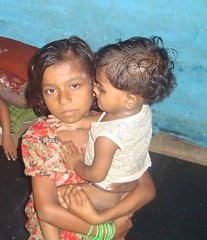
by Anuradha Bakshi | Jul 2, 2010 | Uncategorized
 After more than ten years of working with the less privileged, I often think I have seen it all and am now inured to things. But that is not quite so. Yesterday we went to Manisha‘s home to talk to her mom about her going to boarding school. Yes you rad right our little Alien is off to boarding school sooner than we thought! We had hoped to catch her mom at lunch time but that was not to be as she was still out picking rags and was not expected till late afternoon. However the little home was not left unattended as Sonu, Manisha’s elder sister, was in charge. She is just eight years old.
After more than ten years of working with the less privileged, I often think I have seen it all and am now inured to things. But that is not quite so. Yesterday we went to Manisha‘s home to talk to her mom about her going to boarding school. Yes you rad right our little Alien is off to boarding school sooner than we thought! We had hoped to catch her mom at lunch time but that was not to be as she was still out picking rags and was not expected till late afternoon. However the little home was not left unattended as Sonu, Manisha’s elder sister, was in charge. She is just eight years old.
Sonu welcomed us with a serious smile and asked us to sit down. We did and looked around.
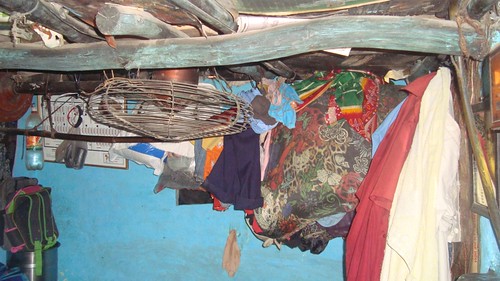
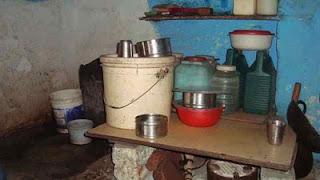
Manisha’s home is not bigger than a store room and yet what struck us was that it was spotlessly clean and well organised. Everything seemed to have a place be it the little school bags in one corner or the mom’s sarees that hung in another. A tiny plank set on two bricks in the third corner was the kitchen and well organised. To beat the incredible heat a table fan was tied to the wooden beam that held the low tin roof of the house in place. One could see that in spite of all odds Manisha’s mom had tried to give the best she could to her children. I cannot find the words to describe what we felt: awe, respect, bewilderment laced with anger and even helplessness. This was the world of the survivor, one we could only salute.
We sat a while talking to Sonu. She told us she was very happy Manisha would be going to a big school and then little a true little mommy she turned to Manisha and told her quietly in a tone way beyond her years: you must study hard and do well! We asked her whether she too would like to go to school and again she relied with a wise smile: how can I, who will look after the baby, she does not stay without me. Those simple words summed up the plight of so many little girls across India. Here was a little girl, one who should still be playing with dolls, who had become an adult overnight. If she did not look after the home, the mother would not be able to earn and no one would survive. She knew it and what was killing was that there was no resentment or bitterness in the girl, it was simply her life.
As I said I thought I had seen it all but this little girl moved me beyond words and was a stark reminder of how little we had achieved and how much more needed to be done.

by Anuradha Bakshi | Jun 27, 2010 | Uncategorized
 A few months back one of our regular and committed donors came to visit. We of course discussed future funding and in the course of conversation he quite candidly admitted that it was easier for him to market individual stories. Finding funds for larger projects like primary classes was more difficult. He wanted me to ‘find’ more possible candidates for boarding school as he felt that was something donors ‘liked’. I must admit I was a little vexed but did not let my feelings show as beggars cannot be choosers! And though I told him that it was not easy to find parents who would hand over their kids and even if they did then it would open flood gates we would be unable to handle, I also promised to look into the matter and find him a suitable candidate.
A few months back one of our regular and committed donors came to visit. We of course discussed future funding and in the course of conversation he quite candidly admitted that it was easier for him to market individual stories. Finding funds for larger projects like primary classes was more difficult. He wanted me to ‘find’ more possible candidates for boarding school as he felt that was something donors ‘liked’. I must admit I was a little vexed but did not let my feelings show as beggars cannot be choosers! And though I told him that it was not easy to find parents who would hand over their kids and even if they did then it would open flood gates we would be unable to handle, I also promised to look into the matter and find him a suitable candidate.
The one child that came to mind was little Mehajabi. Would it not be wonderful to give this little girl a good education. It would transform her life. So sure were we of this possibility that we wrote to our funder friend and he was all set to send Mehajabi to boarding school. But that was not to be. Her mother who at first accepted came back a few days later telling us that she would not send her child away. And when mothers decree one cannot but follow. We did try to gently tell her that this was a one in a lifetime chance for the little girl but the battle was uneven: the mother won. Nothing we would say could change her decision. We had to let it go.
I must admit we all felt sad and even a little unnerved. More so because we knew that mommy’s was jeopardizing the little girl’s morrows. But we did not have the arguments to bat for her. The mother’s logic was simple: she stated that after the heart surgery she could not bear to be parted from her child. Never mind if food was scant, if the roof leaked, if there was no money to pay the few rupees needed to send her to school. She was adamant and we were helpless. No logic could counter the almost irrational love of this mother. We knew what awaited Mehajabi: a few years in a third rate school and then perhaps she would join her mom in cleaning other people’s home just like her young aunt did, till a suitable match was found. Then her life would simply mirror the one her mother was living. On the other hand Babli who also had an open heart surgery was busy making up for lost time and excelling in school. Her mom’s love had not stood in her way.
We wrote to our funder and told him that in spite of our best efforts we were unable to convince the family and thus Mehajabi would not be joining the other pwhy kids at boarding school. He wrote back telling us to find someone else as he really wanted to. We promised him we would do so. A few days later, Vinita our early education coordinator suggested Manisha’s name.
Manisha is a quaint child. She is spirited, vivacious and her little puckered face and uneven teeth makes her look like a little endearing ET. Her teachers fondly call her ‘alien’. But this child’s story is heart wrenching and her future as it stands today very bleak. Manisha comes from an extremely poor family of migrants from Bihar. She has 2 brothers. Her father is a drunk. He is abusive and violent and does not give a single penny towards the running of the household. All they get is blows. Her mom has learnt to survive. She is a rag picker. Every morning she sets out with a big bag and ferrets through garbage heaps trying to salvage anything that can be sold. What she earns from her effort determines what the family will eat.They live in a sunken, dark, dingy hole with a tin roof which is their home.
Manisha six though she looks four. She has been in our creche for 2 years but soon it will be time for her togo to school. Given her circumstances we know that she will never make it to school as school though free requires some resources. Today it is because we go and fetch her that she comes to pwhy. If that did not happen she would turn into mother’s little helper be it with home chores or rag picking. No one invests time let alone money in a girl child. Her life will simply clone her mother’s. Yet Manisha is bright and intelligent and had a hunger for learning, a hunger we see in many children like her.
We have asked her mom whether she would be willing to send Manisha to boarding school. Unlike Mehjabi’s mom, Manisha’s mom was quick to see that this was a one in a life time chance for her daughter, one that would free her from the invisble bonds she was fettered in and maybe give her better morrows. We hope that this will happen though we know that we will need to be with her each step of the way.
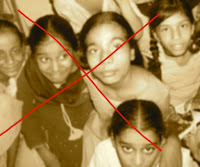
by Anuradha Bakshi | Jun 23, 2010 | Uncategorized
 It is absolutely inane that as a society we have reached the sad day when we need to debate the issue of whether, what I can only call a cool blooded murder, can be viewed as socially acceptable and be called honour killing. I have listened with horror to the recent debates where those in favour – and yes believe it or not there are such monsters around – try to justify taking young lives to protect some misplaced value system.
It is absolutely inane that as a society we have reached the sad day when we need to debate the issue of whether, what I can only call a cool blooded murder, can be viewed as socially acceptable and be called honour killing. I have listened with horror to the recent debates where those in favour – and yes believe it or not there are such monsters around – try to justify taking young lives to protect some misplaced value system.
There has been a spate of such murders in our city in the past few days and those who committed and/or favoured these barbaric acts justified themselves by saying they had no choice or it was inevitable! The story goes like this: if a young girl dares fall in love with someone of another caste or from the same clan then it is taboo and needs to be dealt with and deal they do: they simply kill the child. And to crown it all instead of downright and vehement condemnation by all we hear muted voices that say things like: we do not condone murder but… The but is too loud and unacceptable. The but reeks of vote bank politics, of misplaced and medieval and feudal ways, of weak minds and of rigid ones that refuse to bend. No one is willing to address the situation head on be it within the family, the society or the vote seekers.
Winds of change are blowing and will keep doing so. There is nothing you can do about it. And each such murder is simply paving the way for the next one as politician and law makers remain silent or split hair in ways best mastered by them. So instead of addressing the core of the problem they simply hover around the periphery in the hope of protecting their vote banks. The perpetrators get bolder and bolder and all hell breaks loose. Murder gains acceptability and is even glorified once you call it honour killing!
Since time immemorial parents have opposed their children’s choices but it is almost inconceivable to think that a parent would kill or order the killing of its child. Even in the recent cases the dastardly acts have been committed by brothers helped by their friends and the reason given is to salvage misplaced honour. I have seen this at work.
The incident happened when we first began our work at pwhy. In those times I had no real knowledge of social norms and aberrations. There was a birthday party in the street where we worked and we had been invited. As is often the cases part of street had been covered with a tent and there was a music system in attendance. As is also the often the cases though the birthday party was that of a one year old child, the guests were mostly adults: the entire neighbourhood and a plethora of relatives and friends. And again as is always the case there was a lot of booze though it remained invisible. The party was in full swing and spirits were a tad to high. Bollywood dance numbers screeched through the bad quality speakers and people danced. A young girl, she must have been seventeen then and was one of our staff, started dancing too with her friends. She is a mean dancer and she twirled with abandon. One must understand that young girls rarely have the chance to dance, and parties and weddings are the places where they can show their talent. Her parents where there too seated on the chairs that are part of the decor. Every one was having fun. Suddenly her two brothers appeared and dragged her away hurling abuses. She was dragged to their house where the two lads started beating her. I followed and screamed at them but to no avail. All I could here was the word izzat – honour – shouted repeatedly, as well as – jaan se mardege – we will kill you. Soon the parents came and the beating stopped. The poor girl was in tears and deeply humiliated.
What must have happened is that some drunk guy must have passed a leering comment and the brothers instead of defending the girl who was doing no wrong, decided to salvage the honour by punishing her. It was the same kind of reaction as the one we witnessed in last weeks incident where the murderer brother stated in an interview that he was facing regular humiliation because his sister had married outside her caste and was constantly taunted by his friends. So male ego is hurt and the only thing to do is to eliminate the cause once for all. Never mind if the cause is your sister, the one you played with, laughed with or shared moments. In a split instant all that is forgotten and all the remains is misplaced honour that has to be restored ,so off with her head!
As an eminent lady journalist said recently: that in such cases the daughter’s body has become the vessel holding the family’s honour. She is not considered an individual with her own dreams an aspirations and her own rights. And this cannot be particularly when girls even from extremely traditional families have now stepped out of their homes to taste the world outside.
It is now a matter of choice. Many girls may still accept old ways and this has to be their choice. But if one of them does decide to do otherwise those who love and care for her must understand her choice and accept it. The young girl who danced many moons ago is today an empowered young woman who has been able to get her family to accept her choices. She is aware of the so called honour of her family and I know she will respect it but in her own way and manner and her family has accepted it, in their own way. The battle between generations will go on as it always does and solutions will be found. Murder is not one of them.

by Anuradha Bakshi | Jun 22, 2010 | Uncategorized
 When I decided to start project why many years ago a host of supposed well wishers came out of the wood work to dissuade me to do so. There were the hard core cynics, the gentle detractors and the over anxious friends and relatives. I guess they were all stunned by my decision to sink a large chunk of my newly acquired legacy to as they said: help the poor!
When I decided to start project why many years ago a host of supposed well wishers came out of the wood work to dissuade me to do so. There were the hard core cynics, the gentle detractors and the over anxious friends and relatives. I guess they were all stunned by my decision to sink a large chunk of my newly acquired legacy to as they said: help the poor!
The arguments used to discourage me were varied: what difference can you make in a country as big as India; you know nothing about running an NGO; you will waste you resources and be disappointed; you must be mad; what would your parents say if they were here; you are hijacking your children’s future; you cannot change things, it is a big bad world and you will not survive and so on.
At that time I must admit I had no defense to proffer. All I had was a deep intuitive feeling that what I was setting out to do was right and a stubborn nature that would ensure that I do it ans succeed. It was imperative that I do so and prove my detractors wrong. I set out on my journey with just one thought in mind: if I could change one life it would be worth it.
In the past ten years we have changed many lives and I will not subject you to a string of examples or try to blow the pwhy bugle. But I can say without hesitation that I have been vindicated on all counts. But what really struck me today as I looked at the two little sisters in the picture above was that when you change a life you set in motion what can best be called a ripple effect. Let me explain what I mean. Kiran and Komal are the nieces of Rani, a young woman who today practically runs our field operations in Govindpuri. She first joined pwhy as a unpaid volunteer way back in 2000 but soon graduated to the princely honorarium of 500 rs a month. A school drop out – not for academic reasons far from that but because she was beaten for not paying her fees and her mom decided that enough was enough – she joined us as part time volunteer but slowly she just became indispensable! Today she practically runs project why. Along the way the managed to pass her class X, XII and is now doing her BA second year. Along the way she also became computer savvy and even crossed the seven seas to go and root for pwhy! You must admit her life did change. But that is not all. Along the way two beautiful little girls were born in her family and that is when the ripple effect set in motion.
Today K and K are both in an upmarket school, the kind you and I would send our kids too. Tre admissions are not easy when you have a slum address but Rani never gave up. She wanted to give her little nieces everything she never had. The very best. But it was not easy. However all hurdles were overcome and the two little girls are now in school and doing exceedingly well. What is amusing is that we are all a part of this exciting journey helping with home work when needed or with the inane holiday projects children are subjected to. I must admit that when I watch them laughing and giggling I feel terribly proud and wonder what would have happened had I meekly listened to my detractors of yore years.
So today let me be a little cheeky and address all the barbs thrown at me a decade ago: you can make a huge difference even in a country like India; even if you know; nothing about running what is called an NGO, you can do so if you do not lose heart, your resources are never wasted if they can bring a smile on the face of a child; I guess one had to be a little mad to walk the road less travelled; my parents are surely proud and have walked with me every inch of the way; my children’s future was never hijacked but got better; things changed as the ripple effect set in and the world is not so bad when you learn to look with your heart. I have not only survived but thrived!
by Anuradha Bakshi | Jun 16, 2010 | Uncategorized
Bhopal is in the news.. again! This time it is not just the terrible tragedy that changed the lives of over half a million people in its aftermath but the other side as well: the cover up, the sell out, the dark games and more shocking revelations. What is disturbing is the disconnect between the real human tragedy and the flimsy excuses made for all the blunders: be it the failure to clean up the site or the escape of the main accused.
One thought one had become inured to almost everything as one does live in a land called India! But I could not believe my eyes, years, mind when I saw/heard our Environment Minister quipping: I have held that waste in my hand, I am still alive and not coughing. This after he visited Bhopal last year and was asked about the delay in cleaning up. And wait there is more. He also observed that the greenery around the abandoned premises was better than most other places. He asked if it would have been (so green)… “with all the toxicity around”. But that is not all: he announced that the centre would help in creating a memorial to the tragedy, one that would cost 116 crore, more than the amount needed to supply clean drinking water to the area. “It will be a national monument built in the memory of those who lost their lives in the tragedy,” he said, “and a reminder of the mistakes that were made so that they are not repeated.” I found this in an incisive article entitled Those who still go unpunished!
The article ends by stating that perhaps the envisaged memorial should have statues of all the politicians responsible for the aberrations of the last 26 years.
Bhopal is in the news again. And out comes the can of worms. When the terrible tragedy occurred 26 years ago there were no 24/7 news channels, no investigative journalism and all we got were the headlines in papers and the well filtered bulletins on the sole national TV channel. Then over the years small new items, rarely front page ones, informing all of the progress of the judicial process and maybe the protest of the almost voiceless victims. It is only last week that it all came tumbling out making us aghast and angry. We are suddenly privy to the political games, the judicial ones, the corporate ones and the diplomatic games and sadly once again what is enfolding in front of our bewildered eyes is a new cover up game. So committees will be formed and will give their reports and then what…. A few coins will be again handed out with the hope of shutting disturbing and annoying voices and the dark games will carry on.
The games that have been played for the last 26 years are beyond any sane imagination. A very comprehensive article appeared this week in a leading investigative magazine. Read it. It shows how for a few pieces of silver, every thing that is remotely good, fair, human, humane was sacrificed with impunity. How justice was subverted and how even today nothing has changed. The betrayal of hundreds of thousands of voiceless and hopeless victims is so huge that in the words of a leading activist all you can do is laugh helplessly. This activist was a young university student who had gone to Bhopal in 1984 as a relief worker. He never came back and became the voice the desperate victims so needed. I salute Satinath Sarangi. If there were more such children of India, things would be different. But a lone voice, however strong, however brave and however committed does get lost and silenced in the cacophony that has played louder and louder in the last 26 years. What is needed even today to redress the torts, to bring some solace to those who have suffered for so long is many such voices so that all dissonant voices can be silenced once for all. Otherwise all appeals for justice will turn into helpless laughter.
The victims have another reaction while some crushed and defeated wish they too had perished on that fateful night, others ask whether it would have been better if they had picked up a gun! Is this the last resort our democracy offers its people? When all fails – administration, justice, politics – is death the only option?
The writing is again on the wall but are we man enough to stop and read. I know this innocuous blog is not going to make a difference, but I have to write it because I am angry, because I too feel let down, because I want answers and because I have stopped and heard. And also because I have seen first hand how time and again the poor and voiceless get used and abused.
As I write these words, a bunch of politicians are sitting in a huddle trying to set matters right. I wonder what new clean up game is being invented. Somehow I find it hard to believe that justice will finally be delivered and the real culprits made accountable.
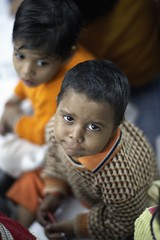
by Anuradha Bakshi | Jun 12, 2010 | women centre
 When I suggested that we begin environment awareness classes with the tiny tots of pwhy, many were sceptical but when Ma’am decrees what can you say! So the classes begun. Every day for about a quarter of an hour the creche kids were told about why water should not be wasted, why plastic was bad for our planet, why trees were needed and so on. Slowly the initially reluctant teachers got motivated and the children were told what to do in case they saw something that was not right. For instance, they if they saw a tap leaking, the teacher suggested they tell an adult and ensure that the tap was closed properly.
When I suggested that we begin environment awareness classes with the tiny tots of pwhy, many were sceptical but when Ma’am decrees what can you say! So the classes begun. Every day for about a quarter of an hour the creche kids were told about why water should not be wasted, why plastic was bad for our planet, why trees were needed and so on. Slowly the initially reluctant teachers got motivated and the children were told what to do in case they saw something that was not right. For instance, they if they saw a tap leaking, the teacher suggested they tell an adult and ensure that the tap was closed properly.
The children listened as they always do, with great concentration. Yet one wondered how much they really imbibed. I was confident that their little brains did process things and that time would tell whether I had been right or not.
Imagine my joy when our creche in charge told me that little Raj, all of 3 years had become a little water warrior. She recounted how a few days back he had gone to the bathroom and come back all agitated mumbling ‘water leak’ ‘water leak’ and tugging at the teacher’s kurta. At first she did not understand what it was all about and even chided him. But Raj did not let go and pulled her pointing towards the bathroom. The teacher followed him and found him showing her the tap that was dribbling a little. She closed it tightly and Raj all smiles clapped in delight. Since that day Raj never fails to point out a leaking tap if he sees one. I wonder whether he does the same at home.
Children are very receptive to such matters. At the women centre we now have quite a few water warriors who have evolved their own ways to save water. Some days back there was just half a can of drinking water left in the centre. Actually our coordinator had hidden the rest as he was irked at the children who threw as much as they drank as they fooled around or spent large amounts of clean drinking water washing the glass after each use. So that day there was no water to drink. When the children asked for water to drink, they were simply told there was none left because it has been wasted unnecessarily. The day was very hot and the children thirsty. The children went back to their class. When it was time to go home, they did not leave but spent time discussing the water issue. Some time later they came to the coordinator and told him they had found a solution. They asked the coordinator to stop allowing children to come and drink at any time but to begin water breaks when all those who needed a drink would go to where the drinking water cans were kept and have a drink.
The new ‘rule’ was adopted and from the next day the centre had drinking breaks. The children would come down and one of them would stand and supervise matters. Children had to drink without placing their lips on the glass so that one did not need to wash it each time, and the supervisor of the day was the one who filled each glass carefully, without any spill and ensured that everyone finished their glass. The system is now in place and works to perfection.
I have always held that change of any kind can only come if we include the smallest, the poorest and the less privileged as an equal partner. Once again I was proved right, or so I would like to believe.
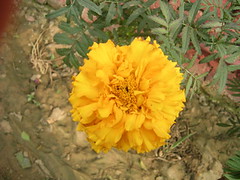
by Anuradha Bakshi | Jun 8, 2010 | Uncategorized
 Not so long ago the nooks and crevices of our house were regularly home to sparrow nests. At that time we often consider this invasion a nuisance though we never destroyed any. I cannot remember exactly when the sparrows stop nesting. I cannot even remember when we actually stop seeing any sparrow at all. But come to think about it it has been a long time since one has laid eyes on that tiny bird, one that once was an intrinsic part of our lives. When a friend told me that new urban designs were responsible for the disappearance of the sparrow, I accepted the fact quietly and learnt to live without our little friends. It was one more instance of man versus nature and man had won again.
Not so long ago the nooks and crevices of our house were regularly home to sparrow nests. At that time we often consider this invasion a nuisance though we never destroyed any. I cannot remember exactly when the sparrows stop nesting. I cannot even remember when we actually stop seeing any sparrow at all. But come to think about it it has been a long time since one has laid eyes on that tiny bird, one that once was an intrinsic part of our lives. When a friend told me that new urban designs were responsible for the disappearance of the sparrow, I accepted the fact quietly and learnt to live without our little friends. It was one more instance of man versus nature and man had won again.
Last week an article in a magazine brought back my little sparrow to life. It seemed that it was not architectural designs but cell tower radiation that had spelt the death knell of not only sparrows but of bees and other creatures. The article makes frightening reading. The cell towers with seem to be proliferating on the skyline with obsessive regularity seem to be the cause not only of the disappearance of little creatures, but of illness and death in human beings. EMR (electromagnetic radiation) seems to have invaded our cities and homes and we are helpless.
In the span of a short decade the cell phone, which was once the prerogative of the rich, has become an essential commodity for all. Look at people walking on the streets, every second one has a cell phone. I was surprised to find out that everyone that works in my home has a cell phone, the maid, the cook, the gardener. Our washer man who comes once a week has one too and so does the plumber, the electrician and everyone who rings the doorbell be it the courier boy or the delivery man of the local grocery store. Look some more, children of all age are proud owners of cell phones. And to meet this exponential growth in demand, cell towers have mushroomed everywhere. For many allowing a cell tower on one’s roof is simply added income. According to the survey done by the magazine even hospitals and schools have offered their rooftops to house cell towers. One can safely say that we are in the throes of a new invasion!
And yet there was a time not so long ago when we managed without them. I belong go the generation that grew up with one fixed phone in the house. Often, as was the case at home, the lone phone was placed in neutral space like a corridor. The phone had a short lead wire and I remember how one use to try and tug at it to get behind a door for those private phone calls that are the prerogative of every teenager. That was the only privacy one got. I also remember how one paced the corridor at particular moments of the day so as to be the one who picked up the phone, or how one glared at anyone else on the phone if that was the time one was expecting a call. The lyrics of an old favourite come to mind: Time it was, and what a time it was, it was , A time of innocence, a time of confidences, Long ago, it must be, I have a photograph, Preserve your memories, they’re all that’s left you (Bookends, Simon and Garfunkel). Come to think about it I have no photograph just fading memories.
I also remember the advent of the cordless phone and how it spelt an new kind of freedom. Never mind if there was a limit of a few meters, one was freed from having to pull and tug at a wire. When the first cell phone came it was way beyond every one’s reach and we all looked at it with some kind of wonder. We could have never thought that in the span of a few years
everyone would own one.
Bees are not your irksome insect that needs to be shooed away. Their hum is a comforting reminder that all is well on planet earth, that the plants will be pollinated in time and food will reach our table. The silence of bees is frightening and the harbinger of terrible times.
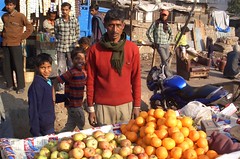
by Anuradha Bakshi | Jun 8, 2010 | commonwealth games
 Every time one feebly attempts to try and listen to those who extol the elusive virtues of the Commonwealth Games, heralded as the panacea to all our urban woes, as the magic wand that will transform our disorderly yet cherished city into a world class one, an aberration appears and calls us back to order. The latest was a news item on the front page of a leading daily. Vendors to be evicted in Games clean-up screamed the headline.
Every time one feebly attempts to try and listen to those who extol the elusive virtues of the Commonwealth Games, heralded as the panacea to all our urban woes, as the magic wand that will transform our disorderly yet cherished city into a world class one, an aberration appears and calls us back to order. The latest was a news item on the front page of a leading daily. Vendors to be evicted in Games clean-up screamed the headline.
The vendors in question are part of the life line of our city. The local roadside cobbler that one rushes too in times of need, the lady who irons our clothes each and every day and has been doing so for decades now, the vegetable vendor who is an intrinsic part of every colony. They are the heart and soul of our city, people we depend on and cannot do without. My ironing lady has been ironing my clothes for the last 30 years. I have seen her children grow. She comes every morning to collect the day’s clothes and her smiling face is something I have got use to seeing. It somehow makes my day. When I was in Paris for 3 years and had to iron clothes myself…ugh… I remembered Phoolmati with fondness and realised how much we depended on her and needed her. The husband’s shirts were always ironed to perfection on so where my crisp cotton saris of yore years.
Many of our parents are such vendors. They are brave and proud people who left their homes many years back to come to the city in the hope of giving a better future to their children. Today their children are working in swank places but they still continue to labour and toil long hours, come what may. This is the only life they know, and quite frankly the only one we know too. I shudder to think where I will now have to head to get my shoe repaired or or to buy the missing element for the nights dinner! And the idea of not having well pressed clothes to wear is nothing short of abhorring.
Vendors, the powers that be say, are a security risk. I find that difficult to fathom. Gentle Phoolmati cannot hurt a fly, nor can our poor old cobbler. Then why this inane decision? The street vendors are the heart of the city and a real necessity. Why be ashamed of them? These small marginal economies are needed in a country with a population like ours. They help the poor survive. But then who cares about the poor. Off with their heads seems to be the order of the day.
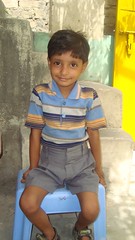
by Anuradha Bakshi | Jun 3, 2010 | God of lesser beings
 Last week as I drove to the project down our little lane, I saw a small posse of men standing on the street in front of our centre’s door. There were about 3 or 4 of them, and one held a sheaf of papers in his hand. They looked harried and worried and I knew at once what was happening. It had to be another broken heart that needed to be fixed. I must confess that my initial reaction was one of mild exasperation: not again were the words that fleeted across my mind. We are just barely recovered from the tragic death of brave and beautiful Heera. I really did not feel we could quite face another ordeal. But of course I did not let any of my thoughts appear on my face: the show had to go on.
Last week as I drove to the project down our little lane, I saw a small posse of men standing on the street in front of our centre’s door. There were about 3 or 4 of them, and one held a sheaf of papers in his hand. They looked harried and worried and I knew at once what was happening. It had to be another broken heart that needed to be fixed. I must confess that my initial reaction was one of mild exasperation: not again were the words that fleeted across my mind. We are just barely recovered from the tragic death of brave and beautiful Heera. I really did not feel we could quite face another ordeal. But of course I did not let any of my thoughts appear on my face: the show had to go on.
This time the little heart that needed to be repaired was that of Kajal all of six years old. Kajal is a tiny little girl who hails from Bairi Aghu a small village in the Beghusarai village of Bihar. She has one older brother age 8 who is in school in class I. Her father earns 2500 rs a month and her mother stays at home. This is their sole income. The family does not won any land or property. When she fell sick last month the family took her to the local dispensary, then the hospital who referred them to Delhi and the All India Institute of Medical Sciences. They came to Delhi, and took a little room on rent @ of 1000 rs and set off to get the little girl checked. They wanted to do everything they could for their little girl. They were told she has a hole in her heart and would need surgery. The cost a whopping 70 000 Rs, almost 3 years of the father’s wage. They were stunned and did not know what to do. Someone told them about pwhy and that is why they stood in silence clutching their papers on that hot morning with hope and fear in their hearts.
My mind was working on overdrive as I alighted from the three wheeler and braced myself to meet them. At that moment I did not know whether we would be able to once again raise the needed funds. Our erstwhile heart fix supporters had long vanished and getting funds now was a long and tedious process. I could imagine myself composing the appeal, posting on the net an hoping for the best.
Not wanting the family to have too much hope. I told them quite frankly that we would do our best but that I promised nothing. I added that I needed a picture of the little girl and that I would get in touch with them as soon as I had some news but it would not be before a few days. I remember the early days when one spent time with the families, trying to talk to them and counsel them. This time there was nothing like that. I was taken surprised at my dismissive behaviour. Had I become inured at the pain of others. Not quite. In hindsight I realise that I was apprehensive and did not really know whether we would be able to live up to the family expectations.
Some time later we had the photograph of the little girl and I set the operation in motion. The first appeal was posted on the pwhy page of facebook. At that time I did not even know the little girl’s name. I wondered how long it would take to garner the needed funds.
I had forgotten that pwhy was a place where angel’s do not fear to tread. A short time later a response appeared on our page. It asked a simple question: how much would the surgery cost? I answered and a few instants later, thanks to the magic of the net, from thousands of miles across the globe I got another message: I will sponsor the surgery. I was stunned. It was all over. Kajal’s little heart would be fixed. It was only a matter of time. The God of Lesser Beings had hear, listened and acted. One of his angel’s had appeared.
This angel is a very special one as she has often appeared in our lives. I remember the first time many years ago when we were battling to survive, she came out of the blue and took charge of things and settled everything right. And since she has always been around, watching us form far. And yesterday she knew we needed her and there she was dispelling all clouds and making the sun shine again. God bless her.
Yes, pwhy, is truly a place where angels do not fear to tread!
Note: we have the funds for surgery but do need some more help to ensure that Kajal gets all her medication and proper nutrition to make sure that all goes well.

by Anuradha Bakshi | Jun 1, 2010 | commonwealth games
 Delhi’s flood of deaths that don’t matter screamed the headline of the morning paper. The writing was on the wall: 10 homeless persons die every day in our soon to be state-of-the-art capital courtesy the Commonwealth Games! The article makes scary reading. A third and soon half of India’s population will be living in cities unprepared or unwilling to build support systems. Solutions are “simple”: Shelters, affordable housing and hundreds of community kitchens. “But we aren’t making these happen,” says Harsh Mander to which the Minister in charge quips back: Delhi didn’t have the resources to build shelters.
Delhi’s flood of deaths that don’t matter screamed the headline of the morning paper. The writing was on the wall: 10 homeless persons die every day in our soon to be state-of-the-art capital courtesy the Commonwealth Games! The article makes scary reading. A third and soon half of India’s population will be living in cities unprepared or unwilling to build support systems. Solutions are “simple”: Shelters, affordable housing and hundreds of community kitchens. “But we aren’t making these happen,” says Harsh Mander to which the Minister in charge quips back: Delhi didn’t have the resources to build shelters.
Well said! We have zillions to build infrastructure for the upcoming games, to pave , unpave and repave perfectly good roads but cannot put up a shelter for those who have been rendered homeless to make way for these hubristic endeavours. But that is not all. The article also states that 93% of the deaths – 3381 souls – are due to starvation. That too in a city where every garbage can is replete with castaway food of the rich, where every wedding is a free for all in food waste, where milk is poured on stone deities and then runs free in the drains.
And it gets worse: men who die aka the homeless are not old and decrepit, but young working people.
A leading newspaper decide to track hunger. Do visit their home page. Browse the statistics of malnutrition of children in our country and if you have the guts browse the titles of their previous articles: mud for meals, 405 million poor by 2011, where tribals kill hunger with flowers, hot rod horror brands children in Jharkand and so on. I did and sat for a long time stunned and shocked. True I have seen more than many. But in spite of that the sheer magnitude of the issue is staggering. Where are we going? Where is compassion and care? Why have become inured to every aberration?
I know first hand how difficult it is to gouge a coin out of people to help others. I have been in the business for ten long years: the business of knocking at hearts and hoping they will open. But they rarely do, particularly in this city. Everyday more people become homeless. We have been silent and helpless witnesses to the destruction of slums, to people losing their homes and lives, to the silent human tragedy that no one sees. I have listened with seething anger to the reasons given for such acts and yes I know how illegal most of these homes are, but then why were they allowed to come up and not only that why where they tolerated for decades and why above all where people dwelling in them given voter’s IDs and ration cards. For political reasons of course as they were large vote banks that could be easily manipulated. Then why do the said politicos disappear when the bulldozers come!
The city is clearing away the poor to make place for the rich: slums get raised to build malls, road side stalls that feed the needy are destroyed to make the city more appealing to look at and yet the so called poor and now homeless are the ones who are busy toiling in the heat and dust to make rich dreams a reality. Something is wrong and we cannot simply be silent and mute spectators. We need to act or at least open our eyes and start looking with our hearts.

by Anuradha Bakshi | May 30, 2010 | Uncategorized
 Charity needs to be sustainable was the headline of a recent article in a leading magazine. Needless to say it caught my eye and I hastened to read it. It was an interview with a top honcho, a lady at that, who shared her view about CSR about charity. For her charity was a redundant term because it is a ‘one-time’ gesture and unsustainable. More power to you lady! I read on and could not but smile as once again it seemed our tale of forgotten biscuits was being revisited.
Charity needs to be sustainable was the headline of a recent article in a leading magazine. Needless to say it caught my eye and I hastened to read it. It was an interview with a top honcho, a lady at that, who shared her view about CSR about charity. For her charity was a redundant term because it is a ‘one-time’ gesture and unsustainable. More power to you lady! I read on and could not but smile as once again it seemed our tale of forgotten biscuits was being revisited.
Ms Bali wants to make her biscuits healthier by fortifying them so as to fight rampant malnutrition ‘covertly’. Hence everyone who consumes the biscuits made by her company, and they are consumed by a large cross section of society, would be ‘healthier’! As she says: Our products are available throughout India. And, by fortifying them, if we are making them accessible to a large mass of people, we are not solving India’s malnutrition problem, but we are contributing to alleviating it. That is what she means by social corporate sustainability a new mantra I presume. Good wishes to her. I will not debate the issue here as this is not the aim of this blog. CSR has always been my ‘bete noire’ and I am yet to comprehend its true motives. I do wonder how enriching biscuits that are then sold amounts to CSR. But I agree with Ms Bali on the fact that charity has to be sustainable and not a one time gesture.
When we sought help to launch and sustain our nutritive biscuits programme, targeted mainly at the beggar children of our city, we were hoping to address the child beggar issue by making the business of begging non-sustainable. If one gave a biscuit instead of the expected coin maybe the handlers and mafia would look for other more lucrative ways. In the bargain you also gave nutrition; a real win-win situation. But sadly it did not work out for reasons I am yet to fathom.
The same happened with our rupee a day programme where we hoped to tap in the one perennial resource of our land: the numbers of people. What we asked was something that each and everyone could part with as one rupee got you nothing, not even a cup of tea. The idea was to make everyone a donor and make everyone participate in bettering the morrows of others. And it seemed so doable as all we were looking for at that time was 4000 such donors. In a land of a billion it seemed simple. But again we failed. And again I do not know why. It seemed so logical.
This has been my battle for 10 long years, a battle I am still nowhere near winning. Right from the outset, when I was handed over my first donation, I knew that this was just a temporary phase and that we would have to look at long term sustainability. The idea of depending on others is neither acceptable nor feasible. Planet Why still seems very elusive as we wait for the expert validation. And where it to go our way, the whole project is daunting in more ways than one. The other side of the spectrum is the tried and tested corpus fund, something I have always abhorred. But has not pwhy been a personal journey of getting over my own bete noires. What is at stake is too precious: the morrows of children and their dreams. So help me God!

by Anuradha Bakshi | May 26, 2010 | Uncategorized
 When Ruchika’s tormentor was handed over a laughable sentence some months back, the nation was outraged. Television channels were replete with debates on the issue and everyone wondered how the matter would end. It had taken many years to nail the elusive perpetrator and all one got was a suspended sentence and a paltry fine that any one could pay. I too had vented my anger and sadness in a blog entitled will I be safe tomorrow!
When Ruchika’s tormentor was handed over a laughable sentence some months back, the nation was outraged. Television channels were replete with debates on the issue and everyone wondered how the matter would end. It had taken many years to nail the elusive perpetrator and all one got was a suspended sentence and a paltry fine that any one could pay. I too had vented my anger and sadness in a blog entitled will I be safe tomorrow!
Today, six months later, the high profile molester is behind bars. he has been there for a week and will spent at least three more weeks there. The law has caught up with him in spite of all his contacts, his connections and the power he once yielded. That it took over two decades is another matter. It took a public campaign to get him nailed. When young Ruchika was molested there was no 24 hour TV, no activism, no public outcry. The family could just knock at various doors that failed to open. And battle lines were drawn with one side playing dirty. The family was humiliated and scorned. The young girl took her life. Justice remained blind. Even today the accused is behind bars not for having caused the child’s death, but for having molested her. Whether he will pay for the bigger crime remains to be seen.
There are millions of Ruchika who suffer in silence every day. They often lock themselves and loose the key. They know that they will not be heard, believed , let alone protected and vindicated. They are far too aware of the reality that surrounds them. They know the might of the adversary and what is often worse is that they often have to continue sharing the same space as most of such cases are perpetrated within the so called safety of one’s home. They just suffer in silence and try to perfect the art of becoming invisible, living in fear day after day. How does one protect such children? How does one protect the little girl abused by a kin? Who will ring the bell for her?
I hope that Ruchika’s case will help us open our eyes. I hope parents and caretakers will begin to look with their heart and see the reality as it is. That they will reach out to the child who sometimes slowly and almost imperceptibly begins to ‘change’. That they will find the time to listen and believe and not be swayed social or other pressures. Till that day does not come little girls will never be safe from lurking predators who prowl secure in the knowledge that no one will dare challenge their power.
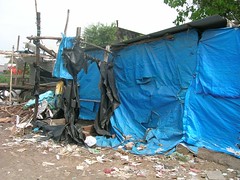
by Anuradha Bakshi | May 25, 2010 | okhla, women centre
 I recently came across an article about a ‘school’ in a garbage dump in Mumbai. The article is uncanny. It could have been written for us. It almost recounted the story of our Okhla centre, a story I had never written. It was time to make amends.
I recently came across an article about a ‘school’ in a garbage dump in Mumbai. The article is uncanny. It could have been written for us. It almost recounted the story of our Okhla centre, a story I had never written. It was time to make amends.
My mind travelled back to the summer of 2004 when one of our teachers came and told us about the plight of a bunch of kids that lived in the slums near her home. Most of them, particularly boys, were not in school and spent their time loitering and were used by predators to steal and push drugs. The are in question was close to a railway track and the little boys were trained to steal from stopped trains anything they could lay their hands off. Moreover the area was home to some notorious drug dealers and little children were easy prey. A few coins or the promise of a treat were enough to get the boys to comply. I was deeply disturbed by this and asked her whether we could begin an outreach centre. Unaware of the lay of the ground, I asked her to find us a room to rent! She smiled and told me that barring factories and slums there was nothing else. I refused to accept easy defeat and requested her to look for something.
A few days later, she came back and said that there was a garbage dump that we could use. These were still early days of project why and I must admit teaching in a garbage dump was almost anathema but then children stealing and peddling drugs was a greater abomination. So I asked her to explore the possibilities. A few more days went by and she came back tome saying that she had talked to the local politicos and cops and got a tacit nod from them with a proviso: that we would move lock, stock and barrel the day the space would be needed. I must add here that the dump we are talking about is ‘owned’ by the government. Beggars cannot be choosers and in this case the need was too great. It was time I visited the place.
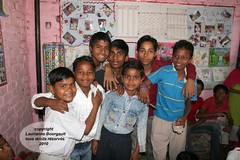 Nothing could have prepared me for what I saw, more so because I was supposedly looking at it with a view to set up a children’s centre. The place was filthy with layers and layers of garbage and along side there were a handful of ramshackle huts that housed mostly physically handicapped persons, who were all known to be drug peddlers. They looked scary to say the least. But the space that lay in front of my eyes was huge by our standards and had ‘potential’. There was no way we could clean the place. How do you clean years of filth. So the next best option was to dump earth on it. We had to get several truckloads. And then keeping in mind the caveat we had been served and had agreed to, we set up a flimsy structure made of bamboo and plastic sheets. And on a warm summer morning classes began. It was June 2004 exactly six years ago!
Nothing could have prepared me for what I saw, more so because I was supposedly looking at it with a view to set up a children’s centre. The place was filthy with layers and layers of garbage and along side there were a handful of ramshackle huts that housed mostly physically handicapped persons, who were all known to be drug peddlers. They looked scary to say the least. But the space that lay in front of my eyes was huge by our standards and had ‘potential’. There was no way we could clean the place. How do you clean years of filth. So the next best option was to dump earth on it. We had to get several truckloads. And then keeping in mind the caveat we had been served and had agreed to, we set up a flimsy structure made of bamboo and plastic sheets. And on a warm summer morning classes began. It was June 2004 exactly six years ago!
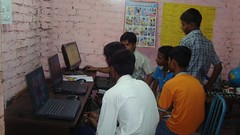 The Okhla story has been one of ups and downs, of elation and frustration. A true pwhy story. It was launched by two very special women, who weathered every storm that came their way. It is a story of strange encounters. It is a story of a bunch of children and their teachers defying every odd be the heat, or the unexpected storms. It is a story of grit, determination and above all triumph. Today Okhla has a secondary class and even a computer centre.
The Okhla story has been one of ups and downs, of elation and frustration. A true pwhy story. It was launched by two very special women, who weathered every storm that came their way. It is a story of strange encounters. It is a story of a bunch of children and their teachers defying every odd be the heat, or the unexpected storms. It is a story of grit, determination and above all triumph. Today Okhla has a secondary class and even a computer centre.
Above all it is the story of a magical garbage dump that metamorphosed into a vibrant space that conjures dreams and desires and makes them come true
by Anuradha Bakshi | May 21, 2010 | manu
The last donation! Sounds ominous but is is not, quite the contrary it is the harbinger of hope, and freedom.
For the past ten years we have been trying to make a difference in the lives of the less privileged and can say with pride that we have succeeded in more ways than one. We launched project why, with the aim of answering all the disturbing ‘why’s that came our way. With limited resources and an abundance of passion and fervor we have helped hundreds of children stay in school and complete their education, have brought smiles on the faces of a bunch of incredible special children and given them reason to live, have rescued a handful of kids who would have otherwise been condemned to join the ranks of child labour but who are now studying in a boarding school and topping their class, sponsored the surgery of a score of children with broken hearts and above all empowered almost fifty adults by giving them employment and dignity.
All this was made possible thanks to donations from people the world over who were good enough to trust and believe in us. Year after year, we shared our success stories with them in the hope that they would once again reach out to us. Whereas this seemed the only doable option in the early years, somewhere down the line came the surreptitious feeling that the pitch was becoming jaded and would not hold forever. Were they not millions the world over engaged in similar work who solicited help via donations and would not donors become satiated sooner or at best later. We needed to find another way, one that would lead us to the last donation.
Many may say, and quite rightly so, that all things must end, and that even a thriving and successful enterprise needs to come to a close. In our case it seemed that the day ‘donations’ would stop falling, the end would happen by force majeure. And more with us as all our fund raising was done by one person with a set of very personal skills. Me!
The unspoken and yet very loud question haunted me. What would happen to project why after I exited. Would it just be a simple swan song with a final curtain call, or would the performance continue. Would project why survive and become sustainable. This I know is the challenge every organisation like ours faces. And this I also know, is not an easy one. I weighed all options, even the one of seeing project why ebb but soon realised that this was not an option we could look at as some of the ‘whys’ we had answered were long term and could not be wished away. There was Manu who had been saved from a life on the streets and who now lived with us along with Anjali and Champa who also has nowhere to go; there were the seven children in school who needed support for many more years. These were the desperate cases but there was also a vibrant and spirited education and empowerment project that deserved to continue. The spirit of project why could not be wished away. Project why had to live on.
Thus began the search for a viable sustainability option, one that could take care of the lost souls as well as ensure continuity. We began to look for success stories to emulate, for organisations that had manage to become sustainable but did not find any. The one way that seemed to work was the one of setting up a corpus fund the interest of which would provide the needed sustenance. But somehow that seemed against the very spirit of project why. We wanted to be freed from the ‘charity’ status and be able to generate funds ourselves. This would keep us on our toes and prevent us from sinking into comfort zones. Project why had to mutate into something greater.
That is perhaps the time when someone mentioned a small project in Cusco, Peru where an organisation had set up guest houses to meet their fund requirements. It was a win win situation and somehow we felt that this was the way to go. We would call it Planet Why.
Planet Why would be a guest house with a difference, a social business generating income to support itself and enable project why to continue its mission, a place where Manu and his disabled friends would live and die with dignity, where project why alumni could be trained in a variety of marketable skills. Planet Why would offer its own brand of hospitality to travelers looking for a different experience. And above all Planet Why would be a green building, the first of its kind in Delhi. We were on cloud nine and felt nothing could stop us.
The first step was to find a find a suitable piece of land at a reasonable price. No mean task in a city like New Delhi where real estate is astronomically priced. We were lucky and located a piece of land not too far from the airport and in a still semi rural area. We shared our vision with our supporters and were fortunate to be able to purchase the land in spite of a few hiccups. It was then time to make plans and find out the costs. Needless to say they were mind boggling and way out of our league. But this did not deter us and we went bravely on the market trying to seek funding. It was not to be, as recession hit the world and all our plans went on to a back burner.
Today after two years in limbo we have decided to revive our dreams and those of the ones who depend on us. Planet Why has to see the light of day as it is the only way we can get out of the charity warp and become truly empowered.
Planet Why will not only enable us to continue our work with the less fortunate but become a real challenge for our team who will need to learn to run a successful business and thus validate all we held as true.
Once again we need you to believe in us.

by Anuradha Bakshi | May 19, 2010 | women centre
 For the past two weeks Ram Bacchan has been guarding our house as the husband his away and everyone at the project felt that we (Shamika and I) needed to be protected particularly in the wake of a recent spate of murders of senior citizens ( I guess I qualify the appellation) in the vicinity. So they decided to send Ram Bacchan, the night guard of the women centre to our home.
For the past two weeks Ram Bacchan has been guarding our house as the husband his away and everyone at the project felt that we (Shamika and I) needed to be protected particularly in the wake of a recent spate of murders of senior citizens ( I guess I qualify the appellation) in the vicinity. So they decided to send Ram Bacchan, the night guard of the women centre to our home.
Ram Bacchan is a little man, not more than five six inches feet. He has a sunny disposition and a huge smile. Moreover he is very dedicated and spends the night awake and alert. I sometimes wonder at the wisdom of having night guards, as is the practice in Delhi, as they are often ordinary unarmed men and would be no match to any professional robber or gang. But look around you and almost every home of a certain stature has one of them. Some even have uniforms of all shades and hues as if that alone would deter potential thieves. Anyway I am not one to complain as it provides jobs to many. I guess it is more a comfort factor to know that someone if awake while you sleep. Another idiosyncrasy of the rich I guess.
We normally never have one but as I said earlier my staff felt over protective and I had no option but quietly acquiesce. So Ram Bacchan has been part of the household for the past two weeks. His is another should I say, success story of pwhy. It began two years ago when one of our students at the women centre came to us and told us that they were being thrown out of their home by their landlord as they had not been able to pay the rent for several months, and thus the young girl said she may not be able to come to pwhy. Gita was and is one our brightest student and she and her siblings had been coming to pwhy for quite some time. We decided to find out what happened and asked her to call her mom. It transpired that the father had a good job in a factory but had been ill for some time and hence lost his employment. The meagre resources of the family had gone in his treatment and they had no money to pay the rent. The staff of the women centre was moved by the plight of this simple and brave family, more so because the children were exceptionally bright. They passed the hat around and paid the rent and found a job for the mother while the father lay convalescing.
A few weeks later, when Ram Bacchan was well again, the centre needed a night guard as the place lies empty post 6 pm, so we gave him the job and never regretted it. His pleasant temperament, his willingness to work and his dedication were appreciated by all. And now he is part and parcel of the women centre and project why! His children come to the centre without fail and are excellent students who often top their class. Gita again topped all sections of her school. His wife still works in the home of our coordinator.
A few months ago all seemed lost for this little family. Had help not come they would have had to move out of their home, the children would have dropped out of school and God only knows what would have happened to them. All it took was a little compassion to set things back on track.
In a day or two the husband will be back and Ram Bacchan will move back to his night post at the centre. It has been a pleasure having him. He brought sunshine in the dead of night. We will miss him.
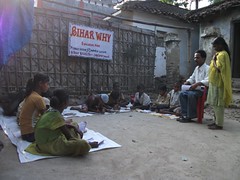
by Anuradha Bakshi | May 15, 2010 | Uncategorized
 BiharWhy! An incongruous and curious name. And yet this the one C has chosen for a the brand new education centre located in a little village in Bihar’s Supaul District. I must admit quite sheepishly that when C had murmured: to go to the village in Bihar and start a branch of pwhy after my long an exasperated diatribe, I had not believed him though I had lauded his intention and offered all support. Imagine my surprise when I got an email from C last week telling me that BiharWhy had been launched. The mail also had some pictures attached.
BiharWhy! An incongruous and curious name. And yet this the one C has chosen for a the brand new education centre located in a little village in Bihar’s Supaul District. I must admit quite sheepishly that when C had murmured: to go to the village in Bihar and start a branch of pwhy after my long an exasperated diatribe, I had not believed him though I had lauded his intention and offered all support. Imagine my surprise when I got an email from C last week telling me that BiharWhy had been launched. The mail also had some pictures attached.
I sat for a long time looking at the pictures and slowly imbibing their stupendous meaning. The open air class, the little white mats on the mud floor, the lovely children and their teacher. It was a dream come true. I could not believe that something I had always held close to my heart had seen the light of day.
When one had taken the decision to only employ people from within the community to steer project why, notwithstanding qualifications et al, there was a covert reason: the hope that one day these very people would take ownership of the programme and take it back to their place of origin. That is why we had employed young people who had left their villages and come to the city in search of a better morrow. C was one such person. When he came to us with his half baked degree from Bihar and some vague skills (fine and art and electrical work!) we employed him to teach the primary children. Over the years C honed his knowledge, took extra classes and graduated to teaching secondary children as well as repairing broken fuses and painting the odd signboard! At that time he seemed set to continue as a teacher with pwhy for a long time. But that was not to be.
When we posted him to another centre he refused the move quite vehemently and I must admit that it was a shocker. I could have reacted as violently and dismissed him for dereliction of duty, but I have always been quite fond of this young man and even if that was not the case, the spirit of pwhy did not allow me the luxury of that decision. This was another why to be answered, a loud one that was a portent of things to come. So I gently proffered some options, one being to take back all he had learnt with us to his village. The seed had been sown. Time would tell whether it would take roots. If it did, then my absurd dream of reverse migration would have been fulfilled.
BiharWhy has seen the light of day. It is a reality today with over 50 children getting access to better education. C surveyed the area, met parents, the local authorities and everyone that mattered. Having been ‘in the city’ for almost a decade has paid as he is somewhat looked upon as the prodigal son that has returned. Everyone was willing to listen to him and wanted him to share his experiences and knowledge. So when he suggested he start a centre like the one in Delhi everyone was a taker.
But this is only the first step. The acid test is yet to be passed. BiharWhy has to survive and thrive and stand on its own. The road is along and not without obstacles. Bihar is not an easy place to operate in and had its own set of whys that will need to be tacked with caution. C will have to battle the administration, the local political power and the complex social problems with patience and determination.
I shared all my concerns with him as I know how difficult it is to survive and thrive! I told him of all the things we had done wrong in the hope that we would not make the same mistakes but it would be foolish to think that things will be easy. I juts hope and pray that he succeeds.
Note: C needs help and support. So of you think this brave venture is worth it, do lend a hand.

by Anuradha Bakshi | May 11, 2010 | manu, okhla
 Every year at about this time I sit down to write the annual report of the project. The report begins with a Directors’ message, and till date I have had no problems whatsoever in writing it. There was always something to write about: a special occurrence, a challenge, a success story, a knotty issue well solved etc. As I sat down to write these messages, nine of them till now, I always felt elated and on top of the world. This time however was different.
Every year at about this time I sit down to write the annual report of the project. The report begins with a Directors’ message, and till date I have had no problems whatsoever in writing it. There was always something to write about: a special occurrence, a challenge, a success story, a knotty issue well solved etc. As I sat down to write these messages, nine of them till now, I always felt elated and on top of the world. This time however was different.
As I settled down to begin writing the 2009-2010 report, I drew a blank. I could not find the one small spark that would guide me through. I sat for a long time racking my brain but to no avail. I must admit I got a little worried: was age catching up, was I losing my memory? I decided to seek help and asked the girls, the one who run the project, to give me a brief on last year’s happenings. They came back to me a couple of days later and told me quite sheepishly that they too had drawn a blank. The year just seemed to have passed uneventfully and placidly, almost in limbo. I was stunned. Was this ‘good’ or ‘bad’ news?
I sat along time pondering. This was our tenth year on the field and the fact that we had nothing out of the ordinary to write about was cause of worry. Did it mean that we had perfected the model to the point where there was nothing more to add and it could thus run on auto pilot – not a happy thought – or was it that we had sunk into a comfort zone that had made us all forget the spirit of project why itself? I would veer towards the later and thus it was time for some serious soul searching.
Before I carry on I would like to set minds at rest. The year gone by was by all parameters a successful one. All programmes were on course and met their targets. Even the normally challenging issue of funding was well in hand. There must have been some minor irritants, but these were too small to leave an imprint. Then why was I feeling disturbed? What this not what one had wanted: to have pwhy run effortlessly?
I spend a long time wondering why I was feeling troubled. My mind wandered back to early times, when we had just begun, the day I had first set eyes on Manu and the one when I had come across the first child who could barely recognise alphabets though she was studying in class IV. And how can I forget the afternoon when a heartless secondary school principal sneered at a bunch of young boys calling them gutter snipes. I still remember the frozen January morning when a lady walked into our tiny office dragging four challenged children and telling us that they had nowhere to go, or the scorching day when a man hobbling on a stick walked in seeking help to fix his son’s broken heart. And the warm morn when I was told that a child had died of burns. And all this in the span of a short year. These were the deafening whys we had to address with confidence and compassion, the two Cs that defined the spirit of pwhy. We answered each one with success, some taking longer than others and that is how project why grew one challenge at a time. Manu was tended to till the day not so long ago when he moved into a proper home. A primary and secondary after school support was created, a day care for the challenged was set up and our heartfix hotel got its first inmate and the scalded boy is now prancing around in a boarding school!
The next years were spent fine tuning the show. Path breaking decisions were taken like the one to only employ people from within the community or the one to use whatever space we could access be it a pig park, a road side or a reclaimed garbage dump! The project grew and from 40 we became 400 and then 800! There was no stopping us. The results were for all to see: children passed from one class to the other. We had our first batch of class X and then class XII and they too did us proud. We were on a constant high. In hindsight I wonder if we missed something along the way.
I am not beating myself. I guess any project or programme does go through a growth process . It is inevitable. But I also feel that unless it is constantly infused with something new, it runs the risk of declining. Is this what is happening. Am I seeing the first signs of weakening? I hope not. But I know it is time to soul search with honesty. I have talked of the achievements but what about the failures or if not failures what about the downside, the challenges not met. The biggest one I guess has been our inability to achieve any success in our sustainability efforts, be it the small early inroads like candles, chocolates, soaps et al or the now seemingly half hearted attempts at fund raising like the one rupee a day programme or the failed raffles? Or even the apparently win-win option like planet why that today awaits expert validation. The reality is that all our efforts to stand on our own feet have not seen any success whatsoever. Project why has survived thanks to donations of people the world over who believed in our dreams of yore years. And whereas these dreams were once worth defending with zeal and passion, they seem a little jaded today. And the one who till date had sold these dreams effortlessly finds it difficult to repackage them.
I wonder what is missing. Have we really gone in limbo.
If I were to look at pwhy today without knowledge of the past, I would just see an after school education programme like so many others and that is no great achievement, even if our children pass their exams with almost obsessive regularity. True there are some add ons like the special children, the foster home etc. But that is it. There is no movement forward, no challenge waiting to be addressed. I do not have to be a soothsayer to say that come next year we will still look the same unless we break the circle and do something. And that is what I intend to do now.
I admit that the discomfort I write about today has been with me for some time and that is what had prompted me to launch the focus on quality programme early this year. Project why children had to imbibe more than just school knowledge, and we needed to stop our obsession with numbers. It has become imperative to give them an identity of their own. But that is not enough. What is needed is to go a step further and look beyond empowerment, it is time to hand over ownership of the programme to the staff and the community at large.
I have tried to do so over the years but met with stubborn resistance from all quarters. Somehow being an NGO – a word I dislike with passion – gave everyone the license to take things for granted. Parents felt we had funds in abundance and thus were almost outraged at our asking a meagre rupee a day, and most the staff found it easier to stick into comfort zones whereby they did their work and got their monthly pack, they somehow seem to think that fund sources are perennial. Even when one tried hard to get them to participate in any resource gathering activity be it the one rupee programme or selling raffle tickets, there was no enthusiasm leaving me to wonder how to shake them out or their torpor. I did tell them that I for one was not everlasting and that even if I were, we had to contend with something called donor fatigue.
Yes that is what is alarming me.
The recent visit by one of our regular donors was an eye opener. In the course of conversation candidly he admitted that it was easier for him to market – to use his expression – individual stories. He wanted me to ‘find’ more possible candidates for boarding school as he felt that was something donors ‘liked’. I will not go into details here, maybe in another post. What matters at this moment is what was left unsaid. Pwhy in its present avatar may not be easy to market. It was strangely devoid of heart wrenching tales. Even the loudest and most deafening why had finally found a permanent answer: Manu had a home!
So time has come to reinvent one’s self and while we wait for the verdict on planet why – should it not be the one we want we will need to put our thinking caps on again- we need to address the ‘what after me’ issue and thereby infuse a new breath of life in pwhy, one that will allow us to resuscitate the flat line. The way forward is to address the ownership issue head on, notwithstanding the resistance.
I must admit that a few days back I would not know how to do that but yesterday the sullen teacher who had refused to move to Okhla for incomprehensible reasons came to me and informed me that he has set up a Bihar Why in his village in a remote district in Bihar. He proudly handed me a set of pictures showing over 40 children studying in the open. I will write a post about this later. He wanted us to help him. My eyes became moist, my heart swelled with pride and I saw light at the end of the dark tunnel. This was the way to go. Staff had to be empowered to start their own nano projects. It would take time I know but it would validate all we had stood for.
Was this a ah ha moment. Maybe. At least it was a step forward, one that could withstand the test of time. I had found my answer. It was time to move on.

 Got a call yesterday. It was all the way form the USA. The caller was a passionate young Indian who wanted to make a difference. He had been deeply disturbed by the hunger that still prevailed across our land and wanted to help alleviate it. A young professional, he had quit his lucrative job to follow his heart. A young man after my own heart! He had been given my number from another young man who thinks with his heart and I was all ears.
Got a call yesterday. It was all the way form the USA. The caller was a passionate young Indian who wanted to make a difference. He had been deeply disturbed by the hunger that still prevailed across our land and wanted to help alleviate it. A young professional, he had quit his lucrative job to follow his heart. A young man after my own heart! He had been given my number from another young man who thinks with his heart and I was all ears.

































